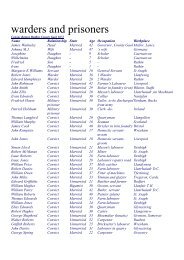pdf, 378.05 KB - Denbighshire County Council
pdf, 378.05 KB - Denbighshire County Council
pdf, 378.05 KB - Denbighshire County Council
Create successful ePaper yourself
Turn your PDF publications into a flip-book with our unique Google optimized e-Paper software.
8 The Bard of Llechryd: Iolo Goch (c.1325c.1398)<br />
St Asaph Cathedral.<br />
‘I must avoid shepherds,<br />
and order those ... on the road to keep<br />
out of my way,<br />
warn them fro afar, not to say ‘boo’ ...<br />
I must avoid the mill<br />
of Henllan, weak-roofed wizened hag<br />
and its clap like a floppy sow ...<br />
and its millrace, on a winter night,<br />
and its stony road, and its ditch;<br />
I must watch out for the trap-filled ford<br />
of Glyn Meirchion and the hollow Coedfron;<br />
I must beware of the deep narrow hollow road<br />
with its rocky slope above the church,<br />
an awful road to Denbigh Fair ...’<br />
Translation by D Johnston, Gomer Press, 1993.<br />
So mused the bard Iolo Goch in about 1380,<br />
nervously contemplating a journey on a new<br />
and untried horse from his home at Llechryd<br />
near Henllan to Denbigh.<br />
This graphic snapshot of medieval <strong>Denbighshire</strong><br />
life is one of many in the poems of Iolo Goch<br />
(‘Red Iolo’), the premier Welsh poet of his time.<br />
Probably born at Llechryd, where he spent most<br />
of his life, he was educated as a chorister at St.<br />
Asaph Cathedral, and always maintained close<br />
links with its bishops and clerics - like Archdeacon<br />
Ithel ap Robert, who gave him the new horse.<br />
10<br />
Some forty of his poems survive, many richly<br />
tinged with humour and self-mockery: he often<br />
calls himself ‘an old cripple’ (Welsh: cleiriach),<br />
whose stubbly beard repelled the girls. But he was<br />
capable of scurrilous satires against the Chester<br />
friar who dared to condemn priests’ girlfriends:<br />
‘great ugly bald-scabby burdock<br />
stiff-trousered seal full of cabbage’<br />
and of a touching ode to a patient ploughman:<br />
‘there would be no life, no world<br />
without him’.<br />
Yet above all Iolo was a ‘praise poet’, proclaiming<br />
the nobility and generosity of his many rich<br />
patrons. During his long life he journeyed<br />
throughout Wales, receiving hospitality and<br />
gifts in mansions and castles from Penmynydd<br />
in Anglesey to Criccieth, Carmarthen and St.<br />
David’s. The land he travelled was a peaceful one,<br />
where Welsh and English lived harmoniously<br />
together. Two of his poems, indeed, are addressed<br />
to King Edward III and Roger Mortimer, Earl of<br />
March and Denbigh: but most honour Welsh<br />
clerics and aristocrats (Welsh: uchelwyr), foremost<br />
among them Owain Glyndwˆ r (Ch.9), then living<br />
in peaceful luxury at his ‘fair court’ of Sycharth<br />
near Llansilin. Within a few years of Iolo’s death,<br />
however, Sycharth was a plundered ruin, and the<br />
pleasant Wales he described was a land at war.<br />
Places to visit<br />
Henllan is a pleasant village with a medieval<br />
church remodelled in Georgian and Victorian<br />
times, as well as the late medieval, thatched<br />
Llindir Inn reputed to be haunted. Enjoy<br />
Medieval <strong>Denbighshire</strong>, a publication detailing<br />
<strong>Denbighshire</strong>’s legacy of medieval remains is<br />
available from libraries and Tourist Information<br />
Centres locally.




